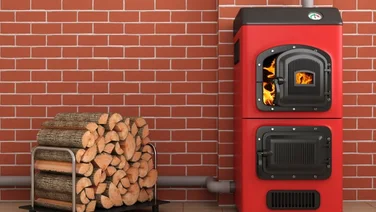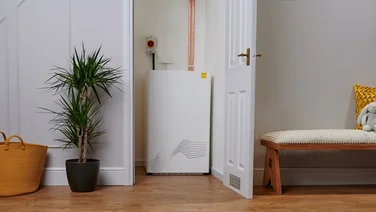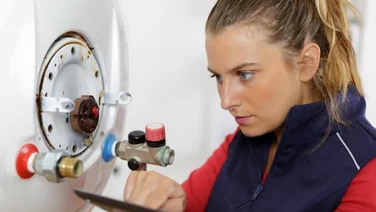We receive a small fee from trusted installers when you request a quote through our site. This helps us keep our content independent, well-researched and up to date – Learn more
Gas boilers are well and truly on their way out (check out the cost of new boiler). Since roughly 20% of UK carbon emissions are created from heating buildings, the UK government has instituted a gas boiler phaseout to help the planet.
The phaseout aims to reduce the number of gas boiler installations in all homes by 80% by 2035, which means homeowners are now having to look for efficient alternatives. But what are the best options out there?
As it stands, heat pumps are the best low-carbon options on the market, and show signs of booming in popularity soon, thanks to government grants making them more affordable.
However, the gas boiler phaseout has also led experts to consider other alternatives, such as the microwave boiler. Although this sounds like some sort of household appliance lovechild, it’s pretty similar to a traditional combi boiler – but much better for the environment.
Want to get ahead of the curve and learn more about this unique technology? Check out our guide to microwave boilers below.

What’s on this page?
What is a microwave boiler?
These new types of boilers work in the same way as traditional ones, but instead of using combustion to generate heat, they use microwaves – a type of electromagnetic radiation.
Unlike their gas counterparts, microwave boilers run on electricity, which helps reduce the amount of emissions they produce. Although some users might worry about this, since electricity prices are spiking around the country, manufacturers say that the electricity load will be about the same as an electric oven.
Sounds good so far, right? Well, the downside is that there’s currently only one microwave boiler out there – and it’s not ready to be rolled out to customers just yet.
In the meantime, you can always look at how much a new boiler might cost with our helpful guide.
Heat Wayv’s microwave boiler
In early 2021, British energy-technology firm Heat Wayv developed the world’s first microwave-powered boiler. The company states that the boiler is 84% efficient in converting electricity into hot water – and another 12% of waste heat is recycled, which gives it a total efficiency of 96%.
Heat Wayv also claims that the boiler would be almost silent when running and ‘virtually maintenance free’.
This company also states that its microwave boiler has the potential to contribute to decarbonisation by removing up to 14% of the UK’s annual CO2 emissions.
Customers will have to wait before they can get this boiler installed into their property though. Heat Wayv has stated that it expects to trial the boilers in homes by the end of 2022, with the first sales to customers targeted for 2024.
Experts have said that the microwave boiler appears to be credible, though a lot of the details of the product are currently confidential.
How does a microwave boiler work?
Microwaves are a type of electromagnetic radiation, and are produced by solid-state components such as insulators, semiconductors, and conductors.
These waves can be tuned specifically to heat water, which can then be used for taking showers and washing up, or channelled to radiators in order to heat the home.
What’s more, unlike traditional boilers, microwave boilers can be controlled by a smart device – meaning users can switch them on or off and monitor their performance much easier. Similar to other smart devices, this could help users to have greater control of home heating, and reduce emissions even further.
How much does a microwave boiler cost?
Since the world’s only microwave boiler is still in the prototype stage, it’s hard to say exactly how much it will cost for different types of properties.
To give people a rough idea of how much it’ll cost them, Heat Wayv has stated that a unit for a three- or four-bedroom home would cost roughly £3,500 – about the same as a similar-sized gas boiler.
This would be considerably cheaper than installing other green heating options, such as air source heat pumps, which can cost upwards of £10,000 to install.
While microwave boilers are expected to cost roughly the same as gas boilers – both to buy and install – they’re likely to cost more to run. This mainly comes down to the fact that they run on electricity, which is much pricier than gas.
To compare, the Energy Saving Trust states that a single kilowatt-hour (kWh) unit of gas only costs around 4p, whereas the average price for a kWh of electricity is currently more than 20p.
However, when it comes to the price of household appliances, it’s also important to take life expectancy into account, which gives microwave boilers the upper hand. Whilst the average gas boiler lasts roughly 15 years, microwave ones should last up to 20 years.
Plus, users won’t be required to have annual emissions checks, and will benefit from the microwave boiler’s high efficiency.
All of these reasons might make the total cost of running a microwave boiler similar to that of a gas boiler. It could even be lower if the government reduces electricity tariffs and introduces more green heating grants.
How is a microwave boiler installed?
Since this boiler is still a prototype, the installation process isn’t crystal clear.
In theory, the Heat Wayv boiler would be installed in the same location as existing boilers and would be able to work with existing pipework and radiators – minimising expense and disruption to the homeowner.
The Heat Wayv would also be connected to the internet, so homeowners could manage their heating through an app.
Types of microwave boiler
Currently, Heat Wayv has two types of microwave boiler prototypes:
- Heat Wayv One – This prototype is similar to a standard combi boiler in size, and can be fitted on any interior wall or retrofitted into any current heating system in less than a day, since it doesn’t need an external vent
- Heat Wayv Max – This is essentially a scaled-up version of the Heat Wayv One unit. Using the same technology and energy platform, the Max has a pressurised 280L internal hot water tank for larger households
Pros and cons of a microwave boiler
| Pros | Cons |
|---|---|
| Reduces household carbon emissions | Runs on electricity, which is more expensive than gas |
| High efficiency rating | Cannot be truly low-carbon unless it is powered by green electricity |
| Compatible with existing home radiators | Currently in the prototype stage |
| Can be accessed through smart devices | |
| Operates almost silently | |
| Currently comes in two different sizes |
Which homes are suitable for microwave boilers?
One huge benefit to microwave boilers is that most homes will be suitable for them. The prototypes are currently available in different sizes, with the units being able to easily fit in most kitchens.
Paul Atherton, Heat Wayv co-founder, said: “The beauty of our microwave boiler is that it is completely compatible with existing home radiators.”
The company has stated that it would initially target the 170,000 new homes built each year.
Some experts said homeowners may need to upgrade the main fuse in their home – and their local electricity network would need to approve the installation of a microwave boiler as well.
How many UK homes have a microwave boiler?
Since microwave boilers are still in the prototype stage, there are no homes in the UK – or the rest of the world, for that matter – that have one.
However, this green home-heating alternative could gain popularity in the coming years, thanks to the government’s gas boiler phaseout.
Summary
Over the next decade, the UK’s home-heating scene is set to have a huge transformation. As fossil-fuel-run boilers begin to phase out, new builds will need to install greener alternatives – and from 2030 onwards, all homes will have to consider this.
Depending on your property, microwave boilers could work perfectly for you. There are, however, more options out there, and we’re here to help you find out all the information you could possibly need.
To find more green heating alternatives, check out some of our helpful guides below:








